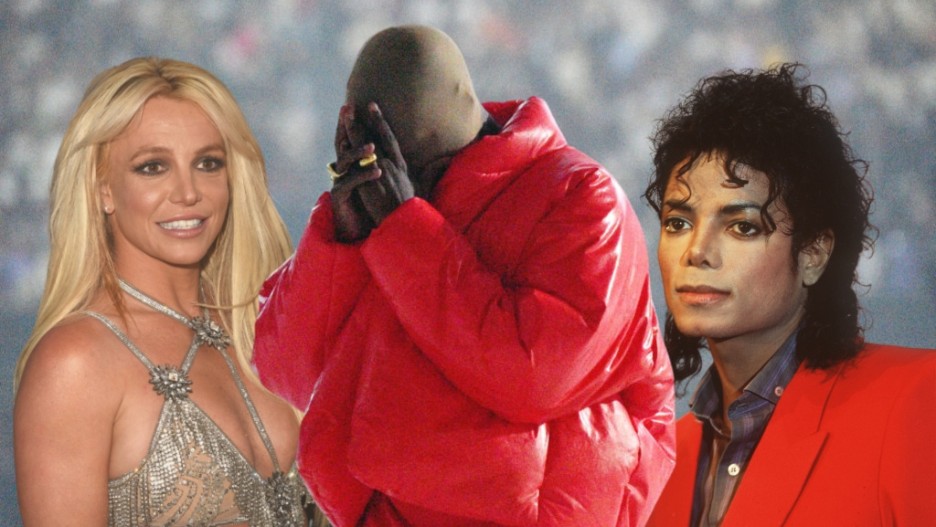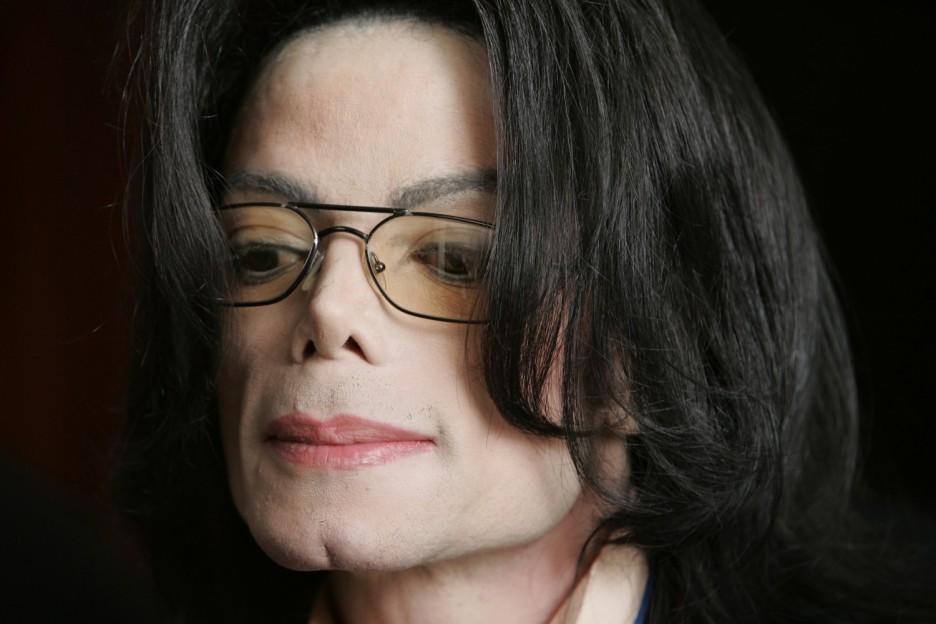Michael Jackson And Britney Spears Warned Us: We Need To Change How We Treat Mentally Ill Celebrites, Starting With Kanye West

It is really, really time to stop making fun of Kanye West.
Yes, celebrity antics can be hilarious. As comedian John Mulaney soliloquizes in his special Kid Gorgeous, being worshipped by crowds of adoring fans "changes you as a person." It's easy to sit back and laugh or scoff at celebrities for being out of touch or ungrounded, and assume that it's simply their lack of connection to the average person that causes their outlandish behavior. But what about when it's something more?
We, as a society, have had to learn this lesson far too many times. Britney was not okay when she shaved her head. Elvis was not okay when he was performing in Vegas. Tom Cruise is not okay now. It's normal to react to the situations they cause with incredulity, laughter, or perhaps even anger; but we should remember that "celebrity" does not mean "immortal," and just like with friends or family, you should be concerned when you see unusual or outlandish patterns of behavior in someone you're familiar with.
"What you're laughing at is likely an out-of-control mind's best attempt at a cry for help - and we have seen what happens to celebrities when those cries for help go unheard."
I'm saying this because we seem to have a very unfortunate sort of "hindsight is 20/20" mindset when it comes to mental health. As soon as someone opens up about a struggle, or worse, is struck by tragedy because of it, there is an outpouring of support and concern - which is, it is worth noting, worlds better than where we were even a decade ago - but still, the days even leading right up to that moment are often marked by cruel harping on the celebrity's issues and mistakes.
You can laugh at Kanye West for changing his name to Ye, running for president, and declaring himself broke all in a two-year period (among numerous other things), but you should know that what you're laughing at is likely an out-of-control mind's best attempt at a cry for help - and we have seen in the past, time and time again, what happens to celebrities when those cries for help go unheard.

Take Michael Jackson, for example. The King of Pop began acting outlandishly late in his career after a litany of health issues stopped him from performing. He secluded himself in an attempted utopia called Neverland Ranch, once almost-prophetically comparing himself to "a haemophiliac who can't afford to be scratched in any way."
In an article by The Observer examining the tragedy of Jackson's famous decline, writer Sean O'Hare describes one particular interview Jackson had in the early 80's with author Gerri Hirshley that should sound familiar by now:
"Jackson was fidgety and preoccupied, seemingly bemused by the interview ritual. At one point, he placed Muscles, his 8ft-long pet boa constrictor, on the table...he led her on a tour of the house, where one room was full of life-size mannequins...He confessed to Hirshey that he only had two friends.
When questioned about his fame, he seemed intensely troubled, even fatalistic. "They think they own you, they think they made you...Being mobbed hurts. You feel like...at any moment, you're going to break."
All that has happened since has seemed, at times, to be a fulfilment of all Michael Jackson's worst fears, his troubled psyche. When the walls went up around Neverland, and the boy-child regressed into a kind of fantasy childhood where every wish could be fulfilled without adult censure, Michael Jackson did, for a brief time, seem to be growing younger."
It's unsurprising that Jackson snapped in this way. Even if he wasn't mentally ill to begin with, the lifestyle he was thrown into was a recipe to make him so: an abusive father who drove him to success with fear, having to deal with mob-level fame before he became a teenager, and a grueling schedule punctuated with drugs and alcohol are all the ingredients one would need to induce mental illness. Add onto that the years of physical illness and painkiller dependence that followed, and the result is the same: A skittish, anxious, desperate personality - an entertainer driven mad by his own spotlight.
Jackson died preparing to perform again. There were a slew of contributing factors - the aforementioned illnesses, deep debt, and yes, even perhaps the personal desire to return to the stage - but the This Is It! Tour was greenlit by other professionals, people close to the star. In 2012, the Los Angeles Times showed just what those people were really concerned about when they released the email correspondence surrounding the ill-begotten venture.
"'We are holding all the risk...We cannot be forced into stopping this, which MJ will try to do because he is lazy.'"
The mirrors you can begin to see between this secondhand rhetoric of Jackson's and the things Kanye West seems to say every few weeks are telling - and frightening. There's that paranoia about authority that he displayed boldly in supporting Trump, and in every conspiracy theory he spouts; there's that extreme inflation of the ego we've seen again and again in comparisons to Jesus, and in his bid at President. They also apparently have in common a manic refrain of loud, proud assurance that they had 'never been more sane,' despite the evidence directly in front of everyone around them.
It seems, however, that that warning fell on deaf ears. What is our responsibility towards the mentally ill?
We may not know the answer yet - there may not even be a definitive answer - but it is certainly greater than enabling and profiting off of their damaging behaviors, and (though this shouldn't have to be said) also greater than simply pointing at someone and calling them crazy. In both Jackson and Spears' situations, the mentally ill person was exploited for profit while essentially being tortured with the thing they once loved most: Performing.
Of course, there is very little that an average member of the public can do to stop such exploitation from happening - but the role social media now plays in advertising gives us a bit more power than we had before. But what can social media do for Kanye West?
"Celebrities with mental illnesses don't just choose to make entertainment: All too often, they BECOME the entertainment."
It's clear that he's not well, but he's also been belligerent, and has said some incredibly upsetting, anger-inducing things. Many fans feel personally betrayed: How, they wonder, did we get from "College Dropout" Kanye, who boldly declared on live TV that "President Bush doesn't care about Black people" to Ye, who met with Donald Trump and said that slavery was a choice in the same week?

The answer is in the question. Kanye West, like Michael Jackson, Britney Spears, and many, many others, is mentally ill. We don't have to guess at his illness like people did with Jackson: West openly talked about having bipolar disorder (like Britney) on David Letterman's Netflix talk show, My Next Guest Needs No Introduction, in 2018.
"I ramp up, and I go high," he told the late-night legend. "If you don't take medication every day to keep you at a certain state, you have the potential to ramp up, and it can even take you to a point where you can even end up in the hospital...and you start acting erratic, as TMZ would put it."
That ramp-up can look incredibly scary from the outside. People often think that those with bipolar disorder are a danger to themselves or others - but while in some cases they are, the common response of stripping the person of their independence is wholly inhumane, and only serves to aggravate the feelings of intense paranoia that cause these episodes in the first place.
It's called MADness for a reason. Historically, people looking at a mental decline from the outside would see, more than anything else, a lot of very angry, aggressive, frustrating behavior - so they would say, "he's going mad." If anything, how commonplace the phrase became actually dulled its meaning, and it seems people have since forgotten that mental illness and pervasive feelings of anger are inextricably linked.
That anger isn't directed nowhere - but it's not usually directed outwards, like people think. More often than not, the anger you see a mentally ill person expressing during an episode is actually frustration with themselves; with their inability to properly express themselves, to control their emotions, to engage "normally" with the outside world.
Being mentally ill is hard, and one of the hardest things about it is the sense of isolation you feel. No matter what you do, no matter how hard you try, most of the people in the world will never be able to truly understand your perspective - they have no way of knowing what life is like for you, and you have no way to reliably describe it. Being a celebrity is often the same way - especially in the age of social media, when everybody has to have a public persona and brand to sell. Combining those two things is a cocktail of loneliness and isolation - a recipe for intense disassociation.
Worse, being a celebrity, especially one that big, holds up a magnifying glass to every event in your life. Not only are celebrities with mental illnesses reminded of their outbursts more often; they are RECORDED more often. A regular person with bipolar disorder is more likely to be able to put their episodes behind them - even if they don't have a support system that knows not to harp on them, stigma will frequenly keep people from discussing it, at least while they are present.
With celebrities, however, it's the opposite. You're watched MORE; it's talked about MORE; it becomes a story people tell each other. Celebrities with mental illnesses don't just choose to make entertainment: All too often, they BECOME the entertainment - and there's no way to leave that stage.
There is an almost cannibalistic instinct behind social mob mentality: It's eat or be eaten when it comes to reputations, and when someone we know does something like suddenly shave her head, (or hang their baby over a balcony, or change his name to Christian Genius Billionare) a mentality like that leaves very little room for compassion. Compound that with the complication of fame, and what you have is a rehashing of one of humanity's oldest and cruelest traditions: A freak show.
Kim Kardashian actually said it best:
"We as a society talk about giving grace to the issue of mental health as a whole, however we should also give it to the individuals who are living with it in times when they need it most."
The answer to the question "what can we do for Kanye" is actually incredibly simple: Just be kind. That is unfortunately often one of the most difficult things to do, especially when we feel personally hurt by someone or when they do something as big as the things Kanye so often does - but it is the only thing we have in our power to help. The best thing to do, the next time Kanye West has one of these episodes of strange behavior, is to remember that this is an illness. You cannot argue with an illness, you cannot convince an illness, and you cannot punish an illness - and malicious commentary or jokes at the expense of the person with the illness are cruel.
Sound the alarm if you can - if you have the ability, energy, and desire. If you don't, the best advice is probably something you've heard before: "If you don't have anything nice to say, don't say anything at all."
I'll leave you with a quote from Ye himself, from that same David Letterman interview:
"This is like a sprained brain - like having a sprained ankle. And if someone has a sprained ankle, you're not gonna push on him more. With us, once our brain gets to the point of spraining, people do EVERYTHING to make it WORSE!"
We may not have much power to protect Kanye West from those who might exploit him, but we do have the power to not make things worse.Be sympathetic. Be kind.
If you or someone you know is experiencing difficulty with their mental health, please consider these resources:
Talk To Someone Now - National Suicide Prevention Lifeline
SAMHSA's National Helpline - 1-800-662-HELP (4357)
NAMI HelpLine | NAMI: National Alliance on Mental Illness
American Psychological Association Crisis Hotlines and Resources
© 2025 Enstarz.com All rights reserved. Do not reproduce without permission.





